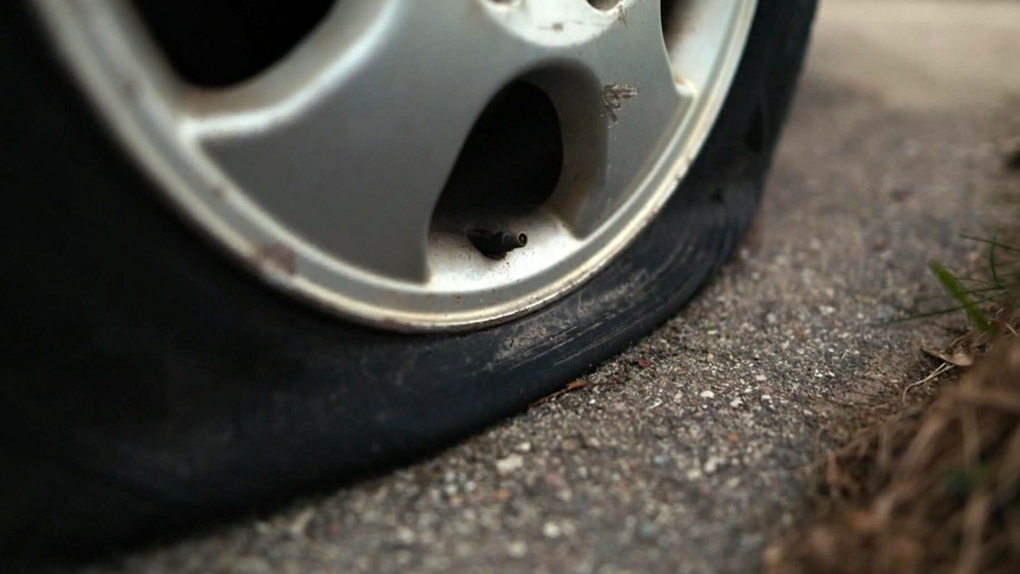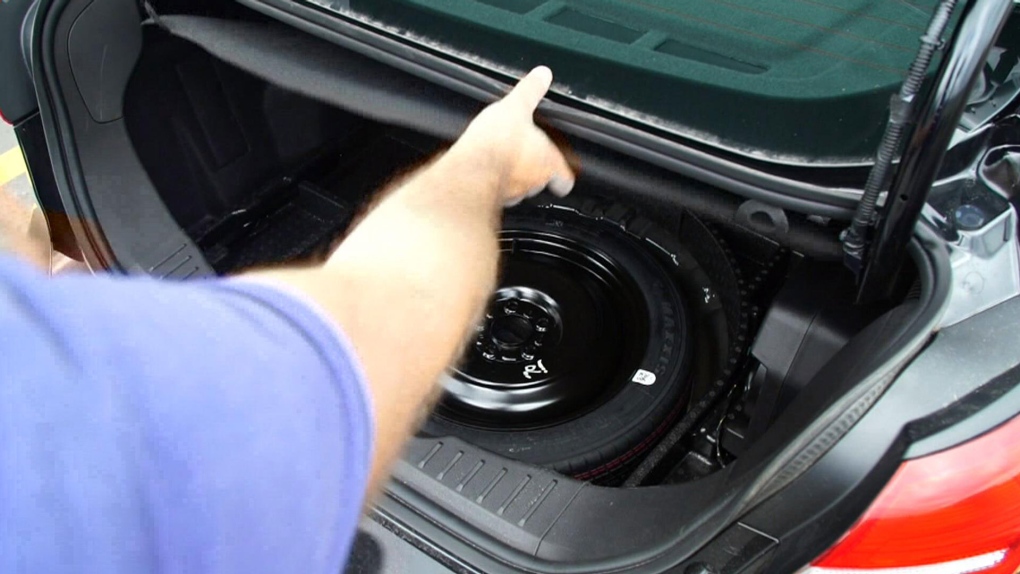More new cars no longer come with a spare tire. Here's what you need to know
If you're driving, it's something you never want to happen, getting a flat tire and ending up on the side of the road.
Luz Plasencia was driving to a spa appointment when she felt a thud.
"Sure enough, I had a flat tire," said Plasencia, who added, "Unfortunately, my car doesn't come with a spare tire."
Vehicles used to come with a "full-sized" spare tire, but about 30 years ago, auto manufacturers moved to a much lighter, smaller tire, sometimes called a "donut spare."
But now, depending on the car you have, it may not have any spare at all.
According to Consumer Reports, if you get a flat, the best advice is safety first.
 Photo shows a car with a flat tire. (CTV News)
Photo shows a car with a flat tire. (CTV News)
"In the event that you do get a flat tire, you should pull off the road as far as you can in a safe area," said Ryan Pszczolkowski with Consumer Reports.
If your car has a space-saver spare tire, you shouldn't forget about it, as it does require your attention.
"Your spare tire expires just like your other four tires," said Pszczolkowski.
To check the age of your spare, look at the last two digits of the DOT number on the sidewall that indicates the year the tire was manufactured, and if it's older than ten years, replace it.
A spare tire only works if it's properly inflated, so check your spare's tire pressure and condition when you check the pressure on your other tires and fill if needed.
Consumer Reports says about 60 per cent of new cars don't come with any spare at all.
"In an effort from the manufacturers to lower production costs and reduce weight for fuel economy, they're just leaving the spare tire out. So don't ever assume you just have a spare tire," said Pszczolkowski.
 A spare tire in the trunk of a car. (CTV News)
A spare tire in the trunk of a car. (CTV News)
Instead, you may get an air compressor or a can of tire sealant that is supposed to patch a damaged tire and get you to a shop where it can be repaired or replaced.
Some cars, mostly luxury models, come with run-flat tires that allow you to continue driving for a set distance, usually 80 kilometres, at modest speeds enough to get you home or to a service center for a replacement.
"You shouldn't be driving around on these tires or a patched tire because that's not a permanent fix," said Pszczolkowski.
The other option is to call for a tow truck and have a new tire installed at an auto shop.
If you're unsure if your car has a spare, it might be a good time to check. Whether you have a spare tire or an inflator kit, you should also know how to use it so you'll be prepared if you get a flat tire.
CTVNews.ca Top Stories

BREAKING Labour Minister Steven MacKinnon will not run for Liberal leadership
Federal Labour Minister Steven MacKinnon will not run in the race to replace Prime Minister Justin Trudeau as leader of the Liberal Party of Canada, he announced on social media Sunday morning.
Former PM Chretien says Liberal party must move back to 'radical centre'
As the Liberal party searches for a new leader, former prime minister Jean Chretien says it's time for the party to move back to the "radical centre" to help its electoral fortunes.
Are there U.S. military bases and American troops in Canada?
The U.S. military has more than 165,000 troops deployed in over 170 countries and territories, including Canada.
'Everything is on the table': Joly won't rule out cutting off energy exports to U.S. in face of Trump tariff threat
Foreign Affairs Minister Melanie Joly is not ruling out any countermeasures when it comes to dealing with U.S. president-elect Donald Trump — his threat of significant tariffs on Canadian imports, in particular.
Royal treasures hidden since Second World War recovered from cathedral
Historical treasures hidden for decades have been uncovered in the crypts of a cathedral, with items including burial crowns and insignia belonging to Medieval European rulers.
Toronto still trying to get students ‘back on track’ with vaccinations after COVID-19 pandemic
Toronto Public Health has begun sending out letters to Grade 11 students who are behind on their routine vaccinations, warning that they could face suspension if they do not comply.
'Thankful for the rest of my life': Woman's final goodbye with father captured on video at Winnipeg airport
One woman is expressing her deepest gratitude to the Winnipeg Richardson International Airport after the staff helped her retrieve the security footage of her final moments with her father.
New Canadian joins the navy, fulfilling his father's dream
Onboard a warship with 250 personnel, if you take the time to listen, you’ll discover a sea of inspiring stories.
As Biden joins the former presidents club, here are some ideas for his retirement to-do list
U.S. President Joe Biden is about to have a lot more free time. He need look no further than past presidents for ideas on what to put on his retirement to-do list.

































